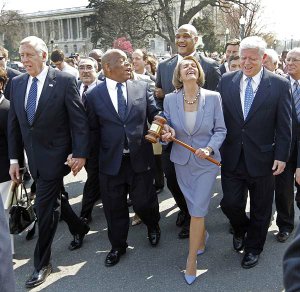American taxpayers are on the hook for who-knows-how-many trillions of dollars in government bailouts/takeovers. And yet, to date, we have little information about how the federal government legally justified unprecedented its use of tax dollars to “bail out” private companies.
Why? Because the Obama administration continues to stonewall the release of documents that would almost certainly shed light on the internal discussions that took place in the Bush administration!
On November 1, 2011, we filed a petition on behalf of former Federal Reserve employee Vern McKinley, asking the U.S. Supreme Court to review a lower court ruling validating the Federal Reserve’s decision to withhold documents about this $29 billion Bear Stearns bailout. (Bailout Nation began with the Bear Stearns bailout in 2008.)
At issue in our Freedom of Information Act (FOIA) lawsuit is whether or not the federal government can withhold documents under the deliberative process privilege of FOIA Exemption 5 without demonstrating that the release of the documents would result in specific harm to government agency decision-making. As you might imagine, the “deliberative process” is loved by government officials who use it to keep as much information as possible about controversial decisions away from the American people.
The United States District Court and the United States Court of Appeals previously ruled in favor of the Federal Reserve and dismissed Mr. McKinley’s lawsuit. However, as Judicial Watch argued in its Supreme Court petition on behalf of Mr. McKinley, these rulings are a departure from Supreme Court precedent and FOIA law:
Despite the plain language of Exemption 5 and this Court’s precedent, the D.C. Circuit has created a different, relaxed two-prong test that a government agency must satisfy to withhold material in the FOIA context…
…By removing the requirement that a government agency must make a specific showing of harm under the deliberative process privilege of Exemption 5, the D.C. Circuit has created a sweeping exemption, causing the FOIA to become more of a withholding statute than a disclosure statute. Petitioner therefore requests that this Court grant certiorari to affirm its reading of Exemption 5 to incorporate the common law deliberative process privilege and to dispose of the different, relaxed test created by the D.C. Circuit.
The Bear Stearns lawsuit, originally filed by Mr. McKinley in July 2009, seeks records of the Board of Governors of the Federal Reserve related to its unprecedented act authorizing the Federal Reserve Bank of New York (FRBNY) to provide “temporary emergency financing” to The Bear Stearns Companies, Inc. Specifically, the Board authorized the FRBNY to extend a “nonrecourse loan” to JP Morgan, which in turn provided the financing to Bear Stearns.
By the way, the head of the Federal Reserve Bank of New York at the time was none other than Timothy Geithner, who is now Obama’s Treasury Secretary.
Now, despite the government’s stonewalling, we did manage to shake loose a few documents in September 2009 that provided a fascinating backdrop to the Bear Stearns deal. These documents included “confidential” term sheets describing the deal, released to the public for the first time, along with behind-the-scenes email correspondence between Treasury officials. According to these records, JP Morgan officials believed Bear Stearns to be “nearly worthless” just hours before the acquisition deal was announced, demonstrating what a sham this deal really was.
The records also show the Bear Stearns bailout was very much in doubt just hours before the deal was announced to the press on Sunday night, March 16, 2008. According to an email sent Sunday morning by FRBNY official Michael Holscher to then-head of the FRBNY and current Treasury Secretary Timothy Geithner, entitled “JPM Findings”:
JPM [JP Morgan] has discovered a large (50bn) structured mortgage position funded by BSC [Bear Stearns Capital], as well as other risk positions that are making them balk on the deal. I have asked for a report on their findings to assess the exposures. They also indicated that BSC’s risk positions are exactly what JPM has avoided in recent years. They estimate the book value of the firm to be nearly worthless…and that risks on other unknowns are to the downside. They inquired about options that the federal government may have to bail out/purchase BSC, we indicated that options are extremely limited.
Ultimately, JP Morgan received the guarantees it needed from the Treasury Department to consummate the deal to prop up the “worthless” Bear Stearns later that evening. But again, we do not know the legal and factual justifications for this unprecedented bailout.
The Bear Stearns records we uncovered are embarrassing enough for government officials. But we are left to imagine what bombshells might be lurking in the documents they continue to withhold.
With his lawsuit, Mr. McKinley specifically seeks “supporting memos and other information” that the Board used to justify the Bear Stearns decision. In response to Mr. McKinley’s request, the Board produced only 48 pages in their entirety and withheld 190 pages in their entirety or in part under Exemption 5.
Not good enough.
Never in American history has so much taxpayer money been spent with so little oversight or explanation. Mr. McKinley believes the American people deserve an explanation from the Federal Reserve about its secretive and massive bailouts – which are still ongoing. But the Federal Reserve, and the Obama administration, are abusing the law and withholding documents without proper justification.
We hope the Supreme Court overturns the erroneous lower court decisions that, if left standing, could eviscerate FOIA law and the public’s right to know what its government is up to.
Incidentally, this lawsuit is just one component of Judicial Watch’s in-depth investigation of the bailouts. This investigation includes additional legal actions made on behalf of Mr. McKinley. Click here for more information.

COMMENTS
Please let us know if you're having issues with commenting.